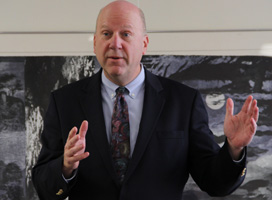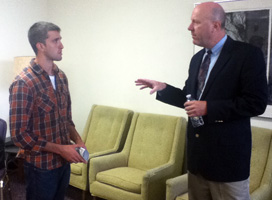

Venture Boldly

 by Rana Tahir '13
by Rana Tahir '13
Attorney John J. Hanlon, legal director of the Downstate Illinois Innocence Project, focused on the lack of constitutional protections for people who are wrongfully convicted when he delivered the 2011 Knox College Constitution Day Lecture on Thursday.
The lecture was titled, "Righting Wrongful Convictions: the Fundamental, but Oft-Ignored, Role of the Constitution." The Downstate Illinois Innocence Project helps wrongfully convicted inmates to prove their innocence, often relying on DNA evidence.
"We're looking for people who didn't do what they were convicted of, not people getting off on a technicality," Hanlon said of the Innocence Project, which includes student workers. "I'm all for guilty people being prosecuted extensively but properly."
"Wrongful convictions have been in this country before it was even a country," Hanlon said, referring to the Salem witch trials. "It's the same exact thing today: false confessions, unreliable witnesses, junk science, defense lawyer incompetence, or police misconduct."
"I respect police work, but I don't respect it when there is misconduct."
Hanlon cited a murder case in which two men were sent to death row. Six months after the conviction, another man confessed to the murder and said the other two men were innocent.
"The state said: We've already got two guys on death row. Why do we want to look at this other guy?" Hanlon said. "That's very troubling."
Hanlon pointed out Illinois' poor track record on wrongful convictions, saying that since the 1990s, 21 people have been released from the state's death row because they were convicted of crimes they did not commit. He represented the defendants in four of these cases.
The role of the Constitution in efforts to avoid or reverse wrongful convictions is "a mixed bag," Hanlon said.
The framers of the U.S. Constitution crafted the Bill of Rights "to prevent innocent people from being wrongfully convicted," he said. But it is difficult for someone to prove his or her innocence after being convicted.
 Convicting the wrong person of a serious crime, especially murder, can lead to other complications, Hanlon added.
Convicting the wrong person of a serious crime, especially murder, can lead to other complications, Hanlon added.
"If we wrongfully convict a person, there is an actual dangerous person still at large," he said.
Hanlon cited the case of Anthony Porter, who spent 15 years on Illinois' death row until a student investigation at Northwestern University found the actual killer and cleared Porter. At one point, Porter had been days away from execution.
Knox College students enjoyed hearing from Hanlon, a Galesburg native who said that he "always had a place in my heart for Knox," partly because his father was a Knox graduate.
"There was great information, and it's good to hear someone talking about a profession you don't really hear a lot about," said Junior Charlotte Young.
The lecture was "really illuminating," Junior Anna Novikova remarked.
Senior Nicolas Cueter thought the lecture was "incredibly relevant to the (Constitutional Law) class I'm taking, so this helped me out a lot. I was also invited to dinner with Mr. Hanlon."
Constitution Day is observed each year to mark the anniversary of the signing of the U.S. Constitution on September 17, 1787.
Published on September 16, 2011